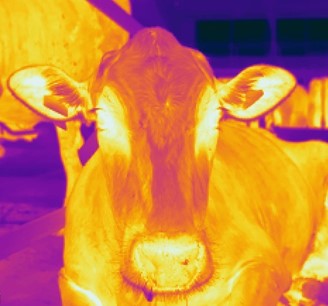Project Description
GHG gas emissions, particularly methane (CH4), carbon dioxide (CO2), and nitrous oxide (N2O) from ruminant livestock, contribute significantly to global warming. In the UK, the agrifood system produces approximately 23% of emissions. Dairy cattle, have a great environmental impact as methane is released directly from digestive feed, and additionally decomposing manure creates CH4, NO2 and ammonia.
Approaches to mitigating the production of GHGs by agricultural animals are recognised as multifactorial (e.g. Cool Farm Tool), but information on the success of current practices in contemporary livestock production is limited. Such strategies include: selected cattle genetics; feed additives (eg Rumitech®, Maxammon, Monensin); altering dietary forage to concentrate ratios (starch-based; cellulosic/non-starch polysaccharide); low or high input systems; and the extent to which nitrogen-containing excreta is captured as fertiliser in crops for animal feeds in a “circular” system.
To address this critical environmental issue, we will investigate nutritional practices to mitigate enteric and excreted GHG emissions from cattle in different farming systems. The student will investigate such practices across dairy farms and determine the extent to which outcomes (cow health; digestive efficiency; indices for milk) associate with GHG emissions by both individual animals and collectively in the farm atmosphere.
Research Objectives:
- To assess the impact of different nutritional strategies, including the utilization of additives on greenhouse gas emissions (CH4, CO2, and N2O).
- To compare the GHG emissions from low-input and high-input farming systems varied in the quantity and composition of diet nutrients.
- To examine the diet nutrient utilization, specifically the utilization of forage (cellulosic/non-starch polysaccharides) and concentrate (starch-based), and its relationship to GHG emissions.
- To investigate the potential for using fecal and urinary excreta as fertilizers and measure ammonia concentrations and the associated GHG emissions.
- To develop mathematical models that relate feed inputs, milk outputs, and digestive utilization to GHG production.
- Investigate the current UK farming practices.
Research Methodology. This project will form a multifactorial approach.
- Meeting with local Agri-businesses (Harbro etc) and participating dairy farmers to determine current levels of awareness/participation in practices to reduce GHG emissions using survey techniques.
- Sample collection on selected dairy farms during routine farm management practices.
-
- Sampling of gas from individual cows and selected locations of the local atmosphere in the cowshed: subsequent analysis including conventional gas chromatography or portable analyser.
- Collecting data from individual cows using the farm robots on milk yield and composition, rumination, cow health, fertility, lameness, ruminal acidosis.
- Analysis of faecal samples, including determining particle size and distribution of feed components (cereal grains, forage, byproducts) and composition (sieve systems and computer assisted microscopy; fractions by chemical analysis) as indicators of feed utilisation.
- Sampling of diet components for physical composition, pre-feeding (microscopy) before consumption and digestion.
- Investigating urinary and faecal excreta as fertilisers, and analysing for ammonia and GHGs including sampling in storage and during handling and application to land.
- Modelling GHG measurements and biological parameters (eg cow numbers, milk yields, nutritional and excretory responses) to provide estimates of predictability, from these indirect measures, of GHG emissions on-farm.
CANDIDATE BACKGROUND
Candidates should have, or expect to achieve, a minimum of a 2.1 Honours degree (or equivalent) in a relevant subject. Applicants with a minimum of a 2.2 Honours degree may be considered providing they have a Distinction at Masters level.
Applications from candidates with experience of working with agricultural animals and any of the techniques outlined in the project description are particularly welcomed. Applicants should be competent in data and statistical analysis. A driver’s licence is beneficial to access remote farms.
As part of the QUADRAT scheme, the student will be required to undertake a mixture of core and generic training, both practical and classroom based, see https://www.quadrat.ac.uk/training/
Photo credit: Zoe Thow, honours student, University of Aberdeen
Supervisors
Catherine HamblyPrimary Supervisor: | Profile: Catherine Hambly Email: c.hambly@abdn.ac.uk Institution: University of Aberdeen Department/School: School of Biological Sciences |
Katerina TheodoridouSecondary Supervisor: | Profile: Katerina Theodoridou Email: k.theodoridou@qub.ac.uk Institution: Queen's University, Belfast Department/School: School of Biological Sciences |
Sharon HuwsAdditional Supervisor: | Profile: Sharon Huws Email: s.huws@qub.ac.uk Institution: Queen's University, Belfast Department/School: School of Biological Sciences |
Additional Supervisor: | Prof Hugh Galbraith, University of Aberdeen, School of Biological Sciences Email: h.galbraith@abdn.ac.uk
Dr Joyce Marumo, Cornell University Email: jlm567@cornell.edu
Dr Sharon Mitchell, University of Aberdeen, School of Biological Sciences Email: s.e.mitchell@abdn.ac.uk |
References
J L Marumo , D Lusseau , J R Speakman , M Mackie, C Hambly , 2022 Influence of environmental factors and parity on milk yield dynamics in barn-housed dairy cattle. J Dairy Sci 105(2):1225-1241
J L Marumo, P Andrew LaPierre, Michael E Van Amburgh, 2023 Enteric Methane Emissions Prediction in Dairy Cattle and Effects of Monensin on Methane Emissions: A Meta-Analysis. Animals (Basel) 18;13(8):1392
R McGuire, S A Huws, C H Foyer, P Forster, M Welham, L Spadavecchia, D Curry, N D Scollan (20230 Agrifood and net zero. Trends in Plant Science. 28(5):495-497
QUADRAT Themes
- earth-systems
- environmental-management






















































